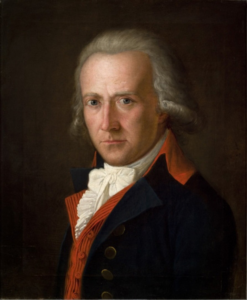Thinking back
(Poet's title: Andenken)
Set by Schubert:
D 99
[April 1814]
D 423
for TTB trio[May 1816]
Part of The Theresa Grob Album
Ich denke dein,
Wenn durch den Hain
Der Nachtigallen
Akkorde schallen.
Wann denkst du mein?
Ich denke dein
Im Dämmerschein
Der Abendhelle
Am Schattenquelle.
Wo denkst du mein?
Ich denke dein
Mit süßer Pein,
Mit bangem Sehnen
Und heißen Tränen!
Wie denkst du mein?
O denke mein,
Bis zum Verein
Auf besserm Sterne!
In jeder Ferne
Denk ich nur dein!
I think of you,
When, through the grove,
The nightingales
Sing out their chords.
When do you think of me?
I think of you
In the darkening glow
Of evening light
By the shaded spring.
Where do you think of me?
I think of you
With sweet pain,
With uneasy longing
And hot tears.
How do you think of me?
O think of me
Until we are united
On a better star!
However distant,
I think only of you!
All translations into English that appear on this website, unless otherwise stated, are by Malcolm Wren. You are free to use them on condition that you acknowledge Malcolm Wren as the translator and schubertsong.uk as the source. Unless otherwise stated, the comments and essays that appear after the texts and translations are by Malcolm Wren and are © Copyright.
☙
Themes and images in this text:
Evening and the setting sun Nightingales, Philomel Stars Springs, sources and fountains Tears and crying Woods – groves and clumps of trees (Hain)
When, where, how?
‘I think of you when the nightingales begin singing’. Time and music are linked. Nightingales know when to start and they mark the time when human beings turn their attention from the here and now, from the daily grind. Music lifts us and encourages to think about more spiritual, less earthly concerns.
It happens as the light changes. Twilight makes us conscious of the light that remains (there has been so much light during the day that we have taken it for granted). The word Dämmerschein captures this awareness of the brightness (Schein) in the increasing dimness (Dämmerung).[1] This fading is often accompanied by a transfiguration in the quality of the light brought about by dramatic sunsets, hinted at in the word ‘Abendhelle’ (evening brightness). This is when the shadows lengthen, and quickly everything is in semi-darkness, allowing the sensitive soul to ‘see’ other places and dimensions. The poet thinks of the beloved here, precisely because this is a place where the beloved is not, where no-one else can possibly be seen.
At the right time, in the right place, we might think in the right way, using oxymorons. We feel sweet pain and fearful longing. The cold of evening makes our tears feel hot. They are normal body temperature, presumably, but at this time, in this place we are not concerned with things as they are. We are concerned with phenomena, how things seem, not the things in themselves. After all, sunset is not an objective reality. It is something that only makes sense in consciousness, since it has to be experienced to exist. Although the sun does not in fact set, the ‘outer’ experience of the sun setting precipitates an inner reflection that connects us with others and seems to liberate us from our subjectivity.
By the final stanza night has fallen. Stars are visible. The moment of transition has passed. In looking at the stars we see their distance from us, and are conscious again that the beloved, who a moment ago seemed so close, is no longer present. As the light faded I wondered what you were thinking. Where, when, how do you think of me? Now that it is dark I think of you. Although the last word of the poem refers to ‘you’ the subject of the sentence is again ‘I’.
[1] Scottish poets used the word ‘gloaming’ (with its overtones of ‘gleaming’) to reflect a similar response to evening light.
☙
Original Spelling Andenken Ich denke dein, Wenn durch den Hain Der Nachtigallen Akkorde schallen! Wann denkst du mein? Ich denke dein Im Dämmerschein Der Abendhelle Am Schattenquelle! Wo denkst du mein? Ich denke dein Mit süßer Pein, Mit bangem Sehnen Und heißen Thränen! Wie denkst du mein? O denke mein, Bis zum Verein Auf besserm Sterne! In jeder Ferne Denk´ ich nur dein!
Confirmed by Peter Rastl with Schubert’s source, Gedichte von Matthisson. Neueste verbesserte Auflage. Wien und Prag bey Franz Haas 1810. page 175; with Gedichte von Friedrich von Matthisson. Erster Theil. Tübingen, bei Cotta, 1811, pages 276-277, and with Friedrich von Matthisson, Gedichte, fifteenth edition, Zurich: Orell, Fuessli & Co., 1851, pages 217-218.
First published in Flora Teutschlands Töchtern geweiht von Freunden und Freundinnen des schönen Geschlechts. Erstes Vierteljahr. Tübingen, 1802. In der J. G. Cotta’schen Buchhandlung, pages 3-4.
To see an early edition of the text, go to page 175 [183 von 296] here: http://digital.onb.ac.at/OnbViewer/viewer.faces?doc=ABO_%2BZ169509602


